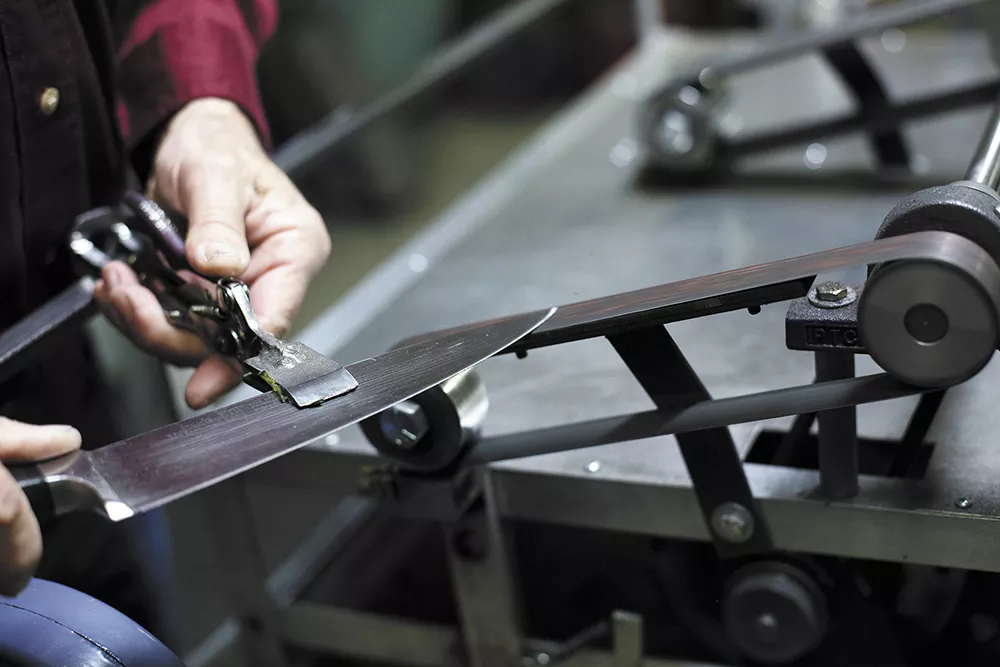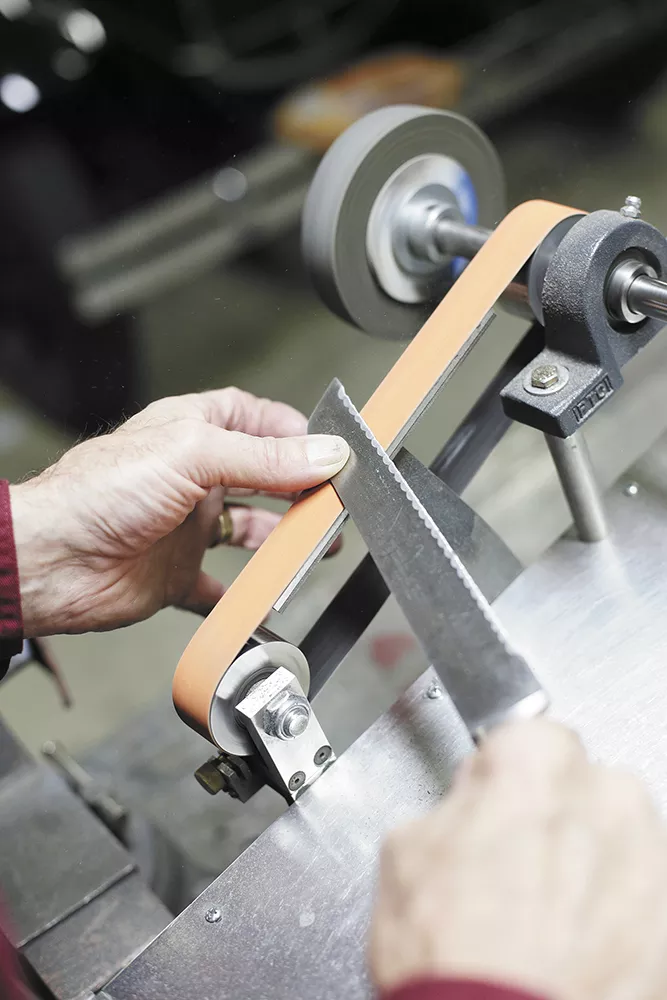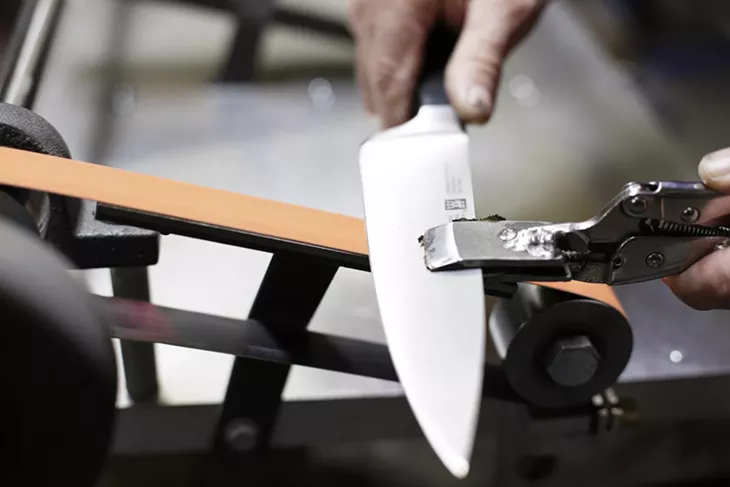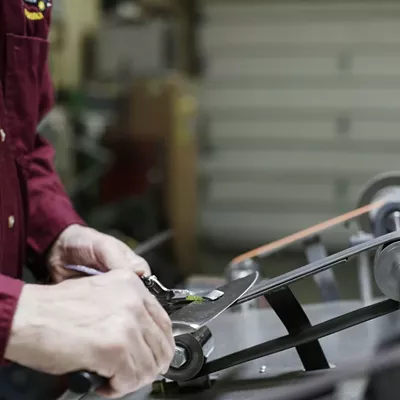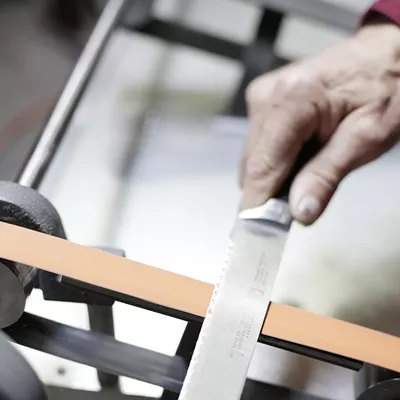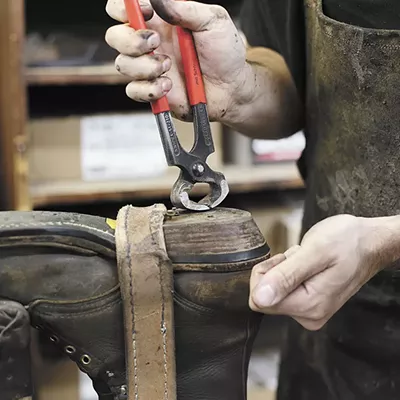
It's hard to overstate how much 72-year-old Steve Schmauch loves knives and knife sharpening. He's been doing it professionally for 21 years, after all.
Leaning over his custom-built sharpening machine in his garage at his home on the South Hill, he runs a set of domestic kitchen knives across whirring belts, periodically checking the sharpness by running the blade along his fingernail. This is the nerve center of Sharpstuff, a renowned local knife-sharpening business.
"I love it," Schmauch says with a toothy grin. "This is a lifetime occupation. I will do this until I can't stand and move.
"I take as much care with a $3 knife as a $3,000 knife," he adds.
Originally from Montana, Schmauch started Sharpstuff several decades ago after working as a geologist for 25 years at the now-dissolved U.S. Bureau of Mines. (He also worked at Bat Conservation International for a stint.) What began as him "cold-calling" local restaurants to see if they wanted knives sharpened has blossomed into a steady business of clients, including local school districts and individuals who value sharp cutlery. He's sharpened knives for local culinary heavyweights like chef Chad White and Churchill's Steakhouse and can handle anything from paper cutters to serrated knives.
As he describes it, the idea for the business came from a seemingly mundane personal anecdote: "I've always had a drawer full of dull knives," Schmauch says. "And I thought, 'If I have this same problem, everybody has this same problem.'"
And he was right. Business is booming and knives happen to have a somewhat unique quality as a commodity in modern consumer culture, as he frames it: "People don't throw away knives very much."
He didn't go to trade school to learn his craft, nor did he have a mentor; "Practice, practice, practice" was his teacher.
"I broke a personal record of 100,000 knives, serrated knives and scissors sharpened this year," he says. "Even at 50,000, I was learning small things. But mainly by that time, I was learning how to perfect the movements. Every movement has a purpose. And I seldom have to sharpen a knife twice."
While most of his business is local, he also has clients around the Inland Northwest, including the Tri-Cities and Pullman — there are "no sharpeners down there," he says — as well as a guy in Texas who mails in his knives. He also says that some soldiers from Spokane bring their knives to him in between tours. Word-of-mouth referrals are his main source of advertising.
For him, the competition isn't thick. There's Sharp Shack, the founder of which was a former customer who paid close attention and adopted his business model. Increasingly, companies will contract with restaurants to provide knives in bulk and exchange new sharp sets for the dull ones that will be run through sharpening machines in a warehouse. But those businesses provide "low-quality" knife sharpening, he says.
Schmauch isn't shy about placing himself miles above the competition: "I've never been able to meet anyone that's even sharpened a fraction of what I've done," he says. "If a knife sharpener hasn't sharpened at least 20,000 knives, he still has a steep learning curve ahead of him."
Given his age, he has thought about what will happen to his business and craft when he passes on. He's considered writing a book about his technique and is currently working with a 13-year-old apprentice to see if he might take the reins despite his stated aspiration of pursuing flight school.
But he concedes that the broader prospects for high-quality knife sharpening are dim.
"I've standardized this. I can teach somebody how to do this in, oh, a few months time. But most young people don't have a few months," Schmauch says. "It may very well die. If I got hit in the street tomorrow, it would just go away." ♦

